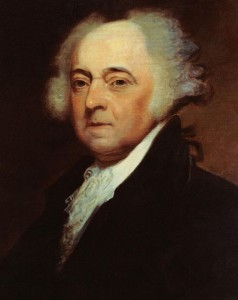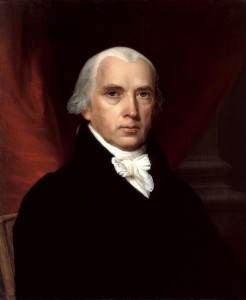Words From Our Founders: John Adams’ Prayer Proclamation
 Today we continue our series examining our Founding Fathers in their own words and considering their high esteem for religion, religious liberty, and virtue.
Today we continue our series examining our Founding Fathers in their own words and considering their high esteem for religion, religious liberty, and virtue.
Below is proclamation of prayer and fasting issued by President John Adams on March 19, 1799. Among other things, Adams offers prayers regarding “awful pestilential visitations” and the health of the American people as well as prayers for peace at home and abroad–presumably a reference to the Quasi-War, Fries’s Rebellion, and the battles and wars taking place between Napoleon Bonaparte and other European powers in Africa and elsewhere.
As no truth is more clearly taught in the Volume of Inspiration, nor any more fully demonstrated by the experience of all ages, than that a deep sense and a due acknowledgment of the governing providence of a Supreme Being, and of the accountableness of men to Him as the searcher of hearts and righteous distributor of rewards and punishments, are conducive, equally, to the happiness and rectitude of individuals, and to the well-being of communities; as it is, also, most reasonable, in itself, that men who are made capable of social acts and relations, who owe their improvements to the social state, and who derive their enjoyments from it, should, as a society, make their acknowledgments of dependence and obligation to Him who hath endowed them with these capacities and elevated them in the scale of existence by these distinctions; as it is, likewise, a plain dictate of duty, and a strong sentiment of nature, that in circumstances of great urgency and seasons of imminent danger, earnest and particular supplications should be made to Him who is able to defend or to destroy; as, moreover, the most precious interests of the people of the United States are still held in jeopardy, by the hostile designs and insidious acts of a foreign nation, as well as by the dissemination among them of those principles subversive of the foundations of all religious, moral, and social obligations, that have produced incalculable mischief and misery in other countries; and as, in fine, the observance of special seasons for public religious solemnities, is happily calculated to avert the evils which we ought to deprecate, and to excite to the performance of the duties which we ought to discharge, – by calling and fixing the attention of the people at large to the momentous truths already recited, by affording opportunity to teach and inculcate them, by animating devotion and giving to it the character of a national act:

